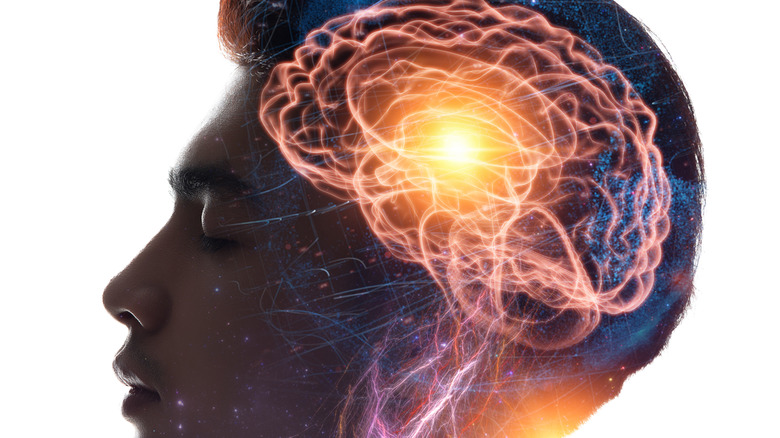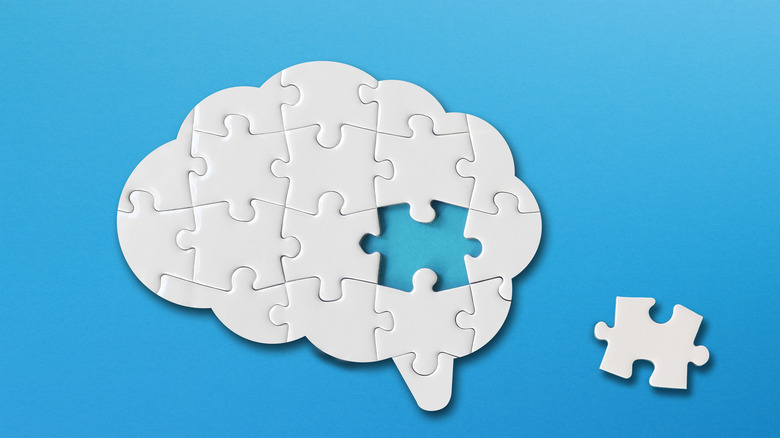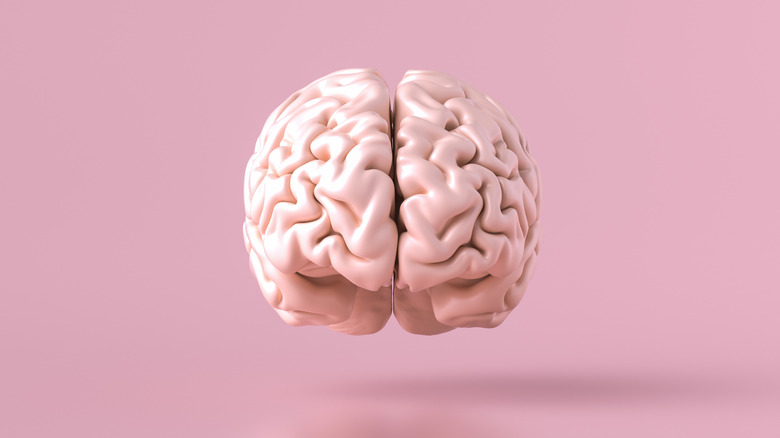Aphasia Explained: Causes, Symptoms, And Treatments
Aphasia can be incredibly frustrating and difficult to deal with, not only for the person suffering from it, but also for the people around them. It affects the parts of the brain that control language, according to the National Aphasia Association, which means that someone suffering from aphasia has a hard time speaking, reading, and writing. Some of the more well-known causes of aphasia are stroke, cancerous tumors, and head trauma.
There are many different types of aphasia, depending on the particular area of the brain that's affected. It also ranges in severity. Some people are unable to access certain aspects of language (such as the names of objects). Aphasia can also render someone entirely unable to communicate. Aphasia affects nearly 2 million Americans, and is a more common affliction than cerebral palsy, muscular dystrophy, or even Parkinson's disease (per the National Aphasia Association).
It's important to understand the different types of aphasia, since its symptoms and effects may vary from person to person.
What causes aphasia?
Aphasia is caused by some sort of brain trauma that affects areas of the brain that control language, says the National Institute on Deafness and Other Communication Disorders (NIDCD).
The most common cause of aphasia is a stroke, which is when a blood clot blocks a blood vessel or a blood vessel pops, cutting off the supply of blood to an area of the brain. Without blood, the brain can't receive oxygen and other critical nutrients that keep it functioning properly. Unsurprisingly, brain cells begin to die without blood.
Severe blows to the head and gunshot wounds can cause damage to areas of the brain that control language. Infections can also cause damage to the brain. Alzheimer's disease, which is considered a progressive neurological disease, can slowly damage areas of the brain and cause aphasia. Damage to these areas of the brain can spill over into other areas of the brain. That's why certain speech disorders, such as apraxia of speech, can happen alongside aphasia.
Broca's aphasia
Broca's area is in the frontal cortex of the brain. According to an article from Johns Hopkins Medicine, it processes some of the sensory input your brain receives and creates a plan for speaking. After it devises a plan, it sends instructions to the motor cortex of the brain, which controls your movements. In particular, it controls the movement of the mouth. If your Broca's area is damaged, this flow of information is disrupted.
Unsurprisingly, if this critical area of the brain for speech sustains trauma or injury, it may result in a disorder called Broca's aphasia. Someone with this particular type of aphasia (also called "expressive aphasia") can expect symptoms such as the inability to use "and" and "the" when communicating (via Johns Hopkins Medicine).
Since Broca's area is toward the front of the brain, damage to this region can also cause physical impairments. It's not uncommon for someone with Broca aphasia to have weakness or impairment of their right arm and leg.
Wernicke aphasia
There's another area of the brain that's known for its importance in communication. It's called Wernicke's area, and it's behind Broca's area in the brain, according to a study published in Neurology. As the author explains, Wernicke's area is responsible for a few components of speech. For instance, it helps retrieve vowel sounds before you speak, so that you can pronounce words correctly. It also helps you repeat things that you hear and retrieve words that you want to say before you say them. While Wernicke's Area doesn't help you comprehend speech, the areas around it do.
Johns Hopkins Medicine explains that people with Wernicke aphasia (or receptive aphasia) experience a loss of speech comprehension, meaning they have trouble understanding other people when they speak. Other symptoms of Wernicke aphasia include garbled speech, adding words that aren't necessary, speaking in long and incoherent sentences, and even making up new words entirely.
Global aphasia
Perhaps the worst form of aphasia, global aphasia means that many parts of the brain that control language have been damaged. People with global aphasia are hardly able to speak properly, per the NIDCD. They may only be able to say a few words, and might simply repeat words or phrases over and over. Additionally, they are unable to read or understand sentences or words as well as the average person.
Despite a lack of communication ability, people with global aphasia likely have intact intellectual capabilities, explains the National Aphasia Association. They simply can't understand or produce language and speech, and often have a hard time remembering and utilizing their vocabulary. This condition is typically caused by a stroke; often, both Broca's and Wernicke's areas are affected. Even though this is an extensive and serious form of aphasia, some people can and do get better after a few months. However, some people never regain function and suffer from long-term disability.
Aphasia affects speech
There are some consistent speech-related symptoms of aphasia. The effects it has on speech can be complicated, since different areas of the brain are affected. Someone with aphasia might forget what words they want to say, according to the American Speech-Language-Hearing Association (ASHA). In their attempt to search for a word, they might say the wrong word even if it's related (for example, saying "fish" instead of "chicken").
Another common problem with aphasia is switching the order of letters in words. They might mix up the first letter in two words, or perhaps even use made-up words. This can be very confusing for someone trying to communicate with them. For someone with aphasia, it can be hard to string sentences together. They'll have an easier time saying single words. They can also mix real words with made-up words and put them in a sentence, causing even more confusion.
As for problems with understanding speech, these may include not being able to "get" jokes and having a hard time following conversations in a noisy environment.
Aphasia affects reading and writing
People with aphasia have trouble with important aspects of communication such as reading and writing, says the ASHA. This can make life very challenging, since reading is often an integral part of interacting with technology (for instance, using computers) and completing medical, legal, or other important forms. It also makes reading books difficult or even downright impossible. Other things that involve comprehension (such as math) can also be very challenging. Things like telling the time or performing basic mathematical calculations might be extremely hard for someone with aphasia to accomplish.
In a study published in the International Journal of Language & Communication Disorders, researchers attempted to look at reading and writing through the viewpoint of people with aphasia. Subjects in the study reported their triumphs and struggles with learning reading and writing skills. Many of the subjects improved in their ability to read and write through their own hard work, which led to an improvement in their quality of life. Some subjects noted that they began to read and write for pleasure. The researchers point out that reading and writing are important for navigating modern society, and people with aphasia had better social interactions as their skills improved. People with aphasia are better able to learn on their own once their reading and writing skills improve.
Diagnosing aphasia
If you are experiencing some of the symptoms of aphasia, you should seek out a qualified medical professional who can diagnose you.
There are a number of tests your doctor will do if they suspect that you may have aphasia. According to the Cleveland Clinic, your doctor will do a physical exam, ask about your medical history, perform diagnostic imaging, and perform other tests to investigate or eliminate the possibility of other conditions with symptoms similar to those of aphasia.
Among the tests your doctor will perform are sensory and nerve function tests. They'll check to make sure that you're not suffering from hearing loss or nerve damage, both of which can cause similar symptoms to aphasia. They'll perform cognitive and memory tests to make sure that you're not experiencing a loss of thinking or memory ability, which is different from aphasia. Diagnostic imaging tests are also part of the process, so that the doctor can see if any areas of your brain are damaged.
Tests for aphasia
Beyond the basic diagnostic tests your doctor can run to rule out other problems, a series of tests can be performed to determine whether or not you truly have aphasia. These tests, along with diagnosis from a speech language specialist, help determine what kind of aphasia you have, says the Cleveland Clinic.
Blood tests can be used to determine if you have an immune problem, as well as to check your blood for poisons such as copper. A computerized tomography (CT) scan can also be performed. CT scans produce 3D images of your body using x-rays and computer imaging (via the Cleveland Clinic). Your doctor can also use a regular x-ray machine to examine you.
Another way doctors can check your brain is with an electroencephalogram (EEG), per the Cleveland Clinic. These are used to scan the electrical activity of the brain. Magnetic resonance imaging (MRI) and positron emission tomography (PET) may also be used. Other tests include genetic testing or a spinal tap.
Treatment options for aphasia
Despite the seriousness of aphasia, some people are able to fully recover without treatment, according to MedlinePlus. However, that isn't always the case. There are a few factors that determine how likely someone is to recover from aphasia. The cause of brain injury is a major factor, as is the region that was injured. The person's age and health history are also important factors in their recovery.
Therapists are crucial in the recovery process, since there are so many unique problems that people with aphasia can face. These patients may suffer impairments in speech, reading, writing, repeating words, or a combination of different things. People with aphasia might even need therapy to regain their ability to use smartphones and other kinds of technology.
For the most part, therapy begins with a speech-language therapist helping the patient train to speak and communicate properly once more. There are multiple treatment options, including one-on-one therapy, group sessions, or computer-aided therapy.
Medications for people with aphasia
Medications are used to treat and help people live with a wide variety of medical problems. Currently, there isn't much evidence that medications are very helpful for people with aphasia. A paper published in Stroke examined treatment options for people with aphasia. The authors note that medication trials were relatively small and poorly designed, so the results might not be accurate. One study the paper cites found that a medication used for aphasia actually made the condition worse. Another drug did not turn out to be more effective than a placebo (or fake treatment), and a third drug was mildly effective at improving language function.
A separate study published in the Journal of Stroke came to similar conclusions. The authors found that while medication alone wasn't very helpful for people with aphasia, using medication in conjunction with speech and language therapy was beneficial. The researchers conclude that behavioral speech and language therapy remains the focus of aphasia treatment, although things like medication can enhance the treatment's overall effectiveness.
Preventing aphasia
There are lifestyle changes you can make to prevent aphasia. These are mostly changes that affect your cardiovascular health, which prevents stroke.
According to MedlinePlus, you can make lifestyle changes that will reduce your risk of stroke, heart disease, and vascular disease. You can also take safety precautions in your daily life to reduce the risk for brain injury. Some examples are donning a helmet when you ride a bike or wearing your seatbelt in a car.
The Centers for Disease Control and Prevention (CDC) provides recommendations for people who want to prevent strokes. Healthy eating is a major recommendation. Eating plenty of fruit and vegetables can reduce your risk of stroke, as can eating less saturated and trans fats. That means less fried food and red meat. The organization also recommends 2 hours and 30 minutes of physical activity for people who want to prevent a stroke. Other tips for prevention include maintaining a healthy weight, limiting alcohol consumption, and quitting smoking.
Complications from aphasia
In addition to disrupting your ability to communicate, aphasia can impact your mental and physical health. People with aphasia have trouble interacting with people, which can cause feelings of increased isolation, says the National Health Services (NHS). Depression and anxiety can also come with aphasia. Mental health problems are important to address, and support from family and loved ones can be crucial in dealing with aphasia. The NHS points out that people with aphasia can have problems communicating their feelings and problems, so they might need someone to communicate their needs for them.
Other complications can occur in the day-to-day life of someone with aphasia, as the experts at Sparrow Health Systems explain. Since communication is an issue for people with aphasia, holding a job can be difficult for them. Relationship problems can also occur due to a breakdown in communication. These struggles in day-to-day life can cause many of the mental health problems that people with aphasia may face.
If you or someone you know is struggling with mental health, please contact the Crisis Text Line by texting HOME to 741741, call the National Alliance on Mental Illness helpline at 1-800-950-NAMI (6264), or visit the National Institute of Mental Health website.
Living with aphasia
Living with aphasia can be very difficult, but family and friends can help. The American Stroke Society explains that people with aphasia don't have problems thinking; they just can't communicate what they think. In other words, they're just as smart as they were before aphasia.
Some ways to help people with aphasia express themselves include asking them yes or no questions (which are easy to respond to) and keeping conversations with them short and easy to understand. Since their words can get garbled and they may have trouble paying attention to what their conversation partners are saying, lengthy and complex exchanges tend to be difficult for people with aphasia to follow.
You can also try to speak with more emphasis and gesturing when you're around someone with aphasia, to give them clues as to what you're saying. Another strategy is to establish a topic with the person before you begin speaking, so that they know what you're talking about.
Questions to ask your healthcare provider
It can be difficult, but certainly not impossible, to navigate an appointment with your healthcare provider if you have aphasia.
Certain strategies outlined by Cedars-Sinai can help you get the most from your appointments. One tip they give is to bring a friend or family member to the appointment with you. Since aphasia makes communication difficult, it can be hard for someone with aphasia to tell their doctor what they need to know. It's also hard to remember what the doctor says, so write down the important things that your healthcare provider tells you (such as medication instructions and new diagnoses).
Additionally, feel free to ask your healthcare provider about their suggestions. If they recommend a test, ask what it is and what it measures. For medications, ask about how you should be taking them and if they have any side effects. You can also ask if there are any treatment options other than what your doctor recommends.















